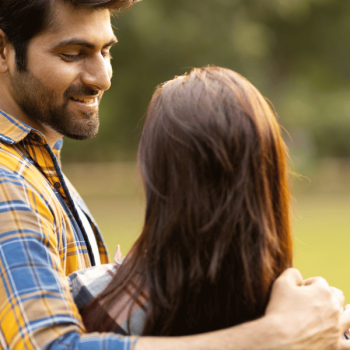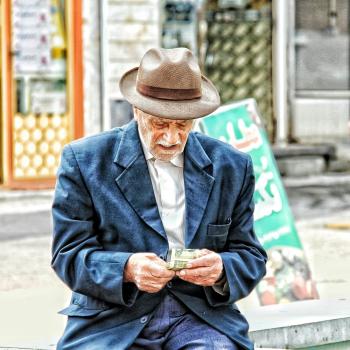Now Featured in the Patheos Book Club
The Vulnerable Pastor
How Human Limitations Empower Our Ministry
by Mandy Smith
Brene Brown's wonderful TED talks have made vulnerability a cultural catchword. And Jesus modeled it, in fact, his redemptive work would have been impossible without it. So if a leading researcher tells us it's crucial and the founder of our faith calls for it, why do we embrace vulnerability in theory but, in practice, work so hard to avoid it? What forces are at work to make vulnerability so difficult?
Last week someone unleashed their pain in my direction. I wanted to unleash my own pain right back. But, as a pastor, I bit my tongue, said only what I thought was helpful to them. At least until I got home, when the resentment set in. Eventually I realized how much shame I felt—"If you were a real leader you wouldn't have just taken that abuse. If you were a real leader, you would have put them in their place. Maybe then you wouldn't feel so small." But when I came across Isaiah 53 I felt a new solidarity with Jesus:
"He was oppressed and afflicted, yet he did not open his mouth."
I had, in my limited way, tried to model Jesus. And, in doing so, I felt weak, dumb, ashamed. What is wrong with us that Christlike leadership has become shameful? Even if we claim to appreciate vulnerability, there are cultural factors at work which make us value something else even more.
And I'm not only talking here about feeling vulnerable—the way we feel when we've put ourselves out there. I'm talking about being vulnerable—the human state of having bodies that tire, minds that don't understand, hearts that break. Here are just three of the many factors in our environment that offer something more appealing than vulnerability:
• Performance Culture: Since before we can remember, we've been assessed according to how well (and quickly) we can frame ideas, how smart, how strong, how close to the ideal we can be. Being measured by grades prepares us for a life of being measured by a job title. It has little room for tiredness or heart-ache. Or rest or play.
• Advertising: Advertising gives us the impression that we can avoid every kind of vulnerability. If our appearance, our financial stability, our success or our parenting feel beyond our control, we're promised a product that can fix it. There's no need to feel our fragile human state if we just buy something.
• Technology: Things that humans used to do for centuries—like embracing mystery, or getting lost, or even going to the library—are no longer necessary. It makes us think we're invincible . . . until the power goes out.
All these are different ways we try to have control. They tell us "If you feel out of control, you're not working hard enough, or not buying the right stuff or there's something wrong with you." But when it's all said and done, these cultural realities of human performance, consumerism and technology offer nothing when faced with exhaustion or depression or heart-ache or poverty or drought or incurable cancer. Working harder can make us feel like we're fixing poverty but soon it will reveal its complexity. Buying something may numb heart-ache but not for long. Technology has ways to heal many diseases but it can never make us live forever. Eventually these human efforts at control lose their power and we are left, once more, with our own, human selves. I've found that while they seem strong, the weakest people are often those whose whole lives, identities, security and comfort are propped up on the thin promises of performance, consumerism and technology. On the other hand, those who are the most unshakeable are those who have had no choice but to rely on something larger. These people have a firm foundation because they have embraced the truth of human limitation. They are not surprised or afraid or ashamed when they find they are small.
Vulnerability is not only a place of feeling our human limitation—feeling the sensitive state of our flesh and hearts and spirits—but a place where human limitation is not shameful, where we know we are all in the same boat. And it's okay. God has not called us to anything more than to be fully human. And to trust in him.
What will it take for us to step away from our feeble efforts to control and fully embrace true vulnerability? Will it lead us to darkness and despair? Or could there be freedom waiting in our embrace of our true nature?
11/1/2015 4:00:00 AM




